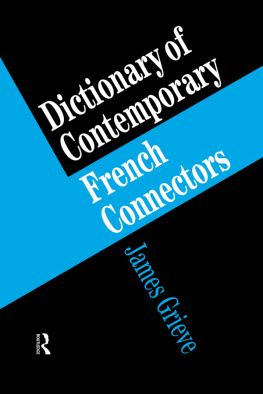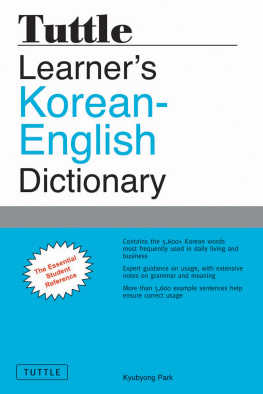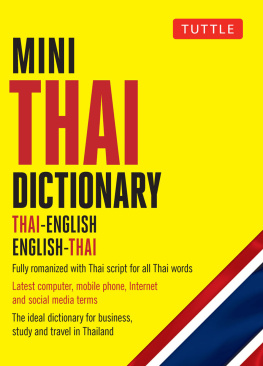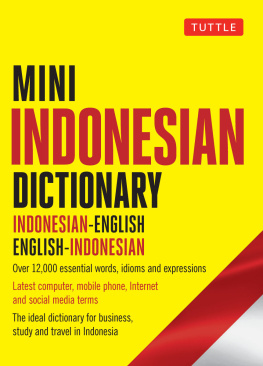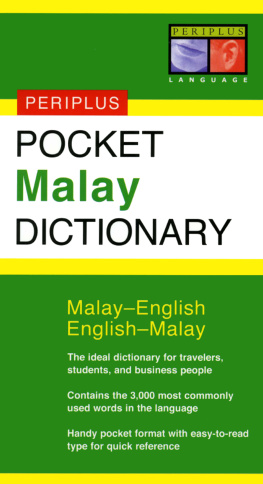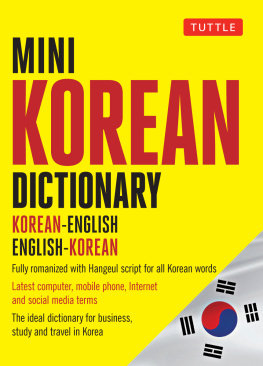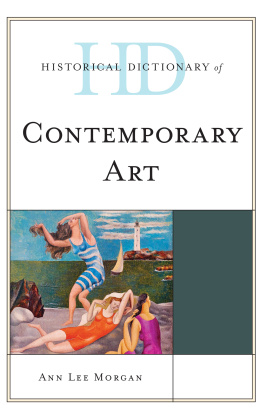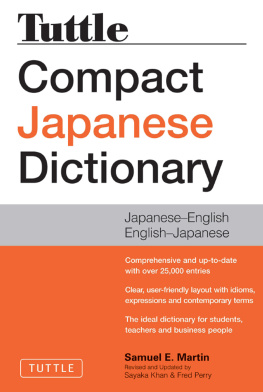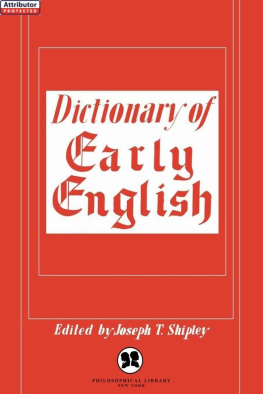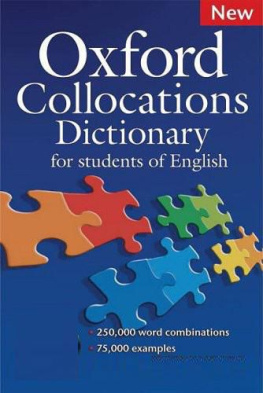Grieve - Dictionary of contemporary French connectors
Here you can read online Grieve - Dictionary of contemporary French connectors full text of the book (entire story) in english for free. Download pdf and epub, get meaning, cover and reviews about this ebook. City: London, year: 2016, publisher: Taylor and Francis;Routledge, genre: Children. Description of the work, (preface) as well as reviews are available. Best literature library LitArk.com created for fans of good reading and offers a wide selection of genres:
Romance novel
Science fiction
Adventure
Detective
Science
History
Home and family
Prose
Art
Politics
Computer
Non-fiction
Religion
Business
Children
Humor
Choose a favorite category and find really read worthwhile books. Enjoy immersion in the world of imagination, feel the emotions of the characters or learn something new for yourself, make an fascinating discovery.
Dictionary of contemporary French connectors: summary, description and annotation
We offer to read an annotation, description, summary or preface (depends on what the author of the book "Dictionary of contemporary French connectors" wrote himself). If you haven't found the necessary information about the book — write in the comments, we will try to find it.
Grieve: author's other books
Who wrote Dictionary of contemporary French connectors? Find out the surname, the name of the author of the book and a list of all author's works by series.
Dictionary of contemporary French connectors — read online for free the complete book (whole text) full work
Below is the text of the book, divided by pages. System saving the place of the last page read, allows you to conveniently read the book "Dictionary of contemporary French connectors" online for free, without having to search again every time where you left off. Put a bookmark, and you can go to the page where you finished reading at any time.
Font size:
Interval:
Bookmark:
Dictionary of Contemporary French Connectors
Connecting words and phrases are essential for discussion, clarity and fluency in any language. French is particularly reliant on connecting language: also and in fact have more than fifteen equivalent words and expressions in French.
This is the first French-English dictionary to focus on this fascinating and crucial part of the language. The dictionary presents nearly 200 full entries in alphabetical order, including:
| au demeurant | en loccurrence |
| au final | et ce |
| cest dire que | or |
| de plus | par ailleurs |
Entries define, discuss and exemplify a whole range of connecting language in French. In addition to these full entries, the dictionary includes some 400 other connecting structures. More than 2,000 authentic examples, chosen from a variety of registers and many different contexts and written mainly in contemporary prose, add further clarity.
This dictionary is the ideal reference for advanced students, teachers and translators of the French language.
James Grieve is a Senior Lecturer in French at the Australian National University, Canberra.
Titles of related interest
Modern French Grammar
Margaret Lang and Isabelle Perez
Manual of Business French
Stuart Williams and Nathalie McAndrew-Cazorla
The French Language Today
Adrian Battye and Marie-Anne Hintze
A History of the French Language
Peter Richard
A History of the French Language Through Texts
Wendy Ayres-Bennett
French: From Dialect to Standard
R. Anthony Lodge
First published 1996 by Routledge
Published 2016 by Routledge
2 Park Square, Milton Park, Abingdon, Oxon 0X14 4RN
711 Third Avenue, New York, NY 10017, USA
Routledge is an imprint of the Taylor & Francis Group, an informa business
Copyright 1996 James Grieve
All rights reserved. No part of this book may be reprinted or reproduced or utilised in any form or by any electronic, mechanical, or other means, now known or hereafter invented, including photocopying and recording, or in any information storage or retrieval system, without permission in writing from the publishers.
Notice:
Product or corporate names may be trademarks or registered trademarks, and are used only for identification and explanation without intent to infringe.
Credits and acknowledgments borrowed from other sources and reproduced, with permission, in this textbook appear on appropriate page within text.
British Library Cataloguing in Publication Data
A catalogue record for this book is available from the British Library
Library of Congress Cataloguing in Publication Data
Grieve, James, 1934
Dictionary of contemporary French connectors / James Grieve.
p. cm.
Includes bibliographical references and index.
1. French language - Connectives - Dictionaries. I. Title.
PC2395.G75 1996
443.21-dc20
95-42785
ISBN: 9780415135399 (pbk)
Lide que la langue est fixe reste debout, dans sa fausset sculaire.
Ferdinand Brunot, 1926
I am pleased to thank the following friends, colleagues and helpers:
Anton Alblas, who worked with cheerful efficiency and initiative as my research assistant in 1993 and 1994, and Sonia Wilson who did the same in 1994.
Graeme Clarke, the Director of the Humanities Research Centre at the Australian National University, who was good enough to ask me to be his assistant for a happy and busy twelvemonth, 1993, in which I made much progress on this work.
Iain McCalman, the Associate Director of the Humanities Research Centre at the Australian National University, who housed me there as a Sabbatical Writing Fellow for some further months in 1995, enabling me to complete the work.
Jacqueline Mayrhofer, of Troyes and Canberra, whose patience and generosity as a friend and cooperativeness as a colleague have not only endeared her to me for many a year but have much benefited the present work.
Jacques Thiriot, who helped with au final and handsomely housed me at the Collge international des traducteurs littraires, Espace Van Gogh, Arles (Bouches-du-Rhne), of which he is the Director.
Alain Arnaud and Gloria Ruhmer, also of Arles, who offered in abundance words, wine and good cheer.
Mlle Marie-Thrse de Fivreuse of the Bibliothque nationale, Paris, and Mlle Fabienne Martin of the Mdiathque dArles.
Angus Martin, of the University of Sydney, and Carol Sanders, of the University of Surrey, who gave the project vital support in the right quarter.
Jeannie Gray, who for the love of me read the whole text and made it better than it was.
And last but far from least, la parfaite bibliothcaire, Mme Irne Rouanet of the Mdiathque dArles, qui, malgr le fait de travailler dans la bibliothque sans doute la plus bruyante de France, sait tre gentille, serviable, efficace et silencieuse.
La langue crite qui recherche la prcision et qui a le loisir dune prparation rflchie complique volontiers lexpression de la relation entre les phrases suivant les nuances de la pense.
J. Vendryes, Le langage : introduction linguistique lhistoire (La renaissance du livre, 1921, p. 174)
This dictionary is intended for any speakers of English who wish to improve their ability to read and write discursive, dialectical or analytical French prose. I assume it will be consulted both by those seeking a French equivalent for an English structure and by those who seek clarification of the functioning of a French structure.
Perhaps the latter will find the dictionary more informative than the former, if only because of the difficulty of giving a useful list of English equivalents from which to start. I do give such a list, Some English structures, at page 19. Whether it will prove very useful in practice remains to be seen. By virtue of the way we speak our language and pronounce it, English expository connectors tend to be much less precise than French. There are, if not fewer of them, at least fewer that are necessary and specific in their function: one could almost get by in English with a basic half-dozen, actually, also, anyway, but, however and in fact. There is far less consensus among English-speakers about, say, the difference between indeed and in fact than among the French about the difference between en effet and en fait. And if one starts from what is sometimes called a charnire-zro (Vinay & Darbelnet, 225), meaning the lack of an explicit connector, a common feature of English, how does one find an appropriate French structure? How can you list a more or less non-existent English equivalent for the points de suspension as used to hint at a coming pun or joke, especially when English-speakers are also ignorant of the existence and special role of this connector in French? Or, starting from a single English structure such as on the one hand on the other, how is one to direct English readers both to dun ct de lautre and to dune part dautre part, without warning them that each of these two structures, which usually work in quite distinct ways and tend not to be interchangeable, is an equivalent for only one of the two functions combined in the English structure? This versatility, these absences and the comparative imprecision of the functioning of many English connectors lessen the potential usefulness of any attempt to cross-list them with straightforward French equivalents. Indeed, were it possible to pair off English and French connectors in that way, other dictionaries would have done it long ago.
Font size:
Interval:
Bookmark:
Similar books «Dictionary of contemporary French connectors»
Look at similar books to Dictionary of contemporary French connectors. We have selected literature similar in name and meaning in the hope of providing readers with more options to find new, interesting, not yet read works.
Discussion, reviews of the book Dictionary of contemporary French connectors and just readers' own opinions. Leave your comments, write what you think about the work, its meaning or the main characters. Specify what exactly you liked and what you didn't like, and why you think so.

